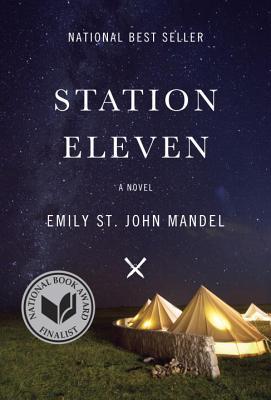Whenever there is a new, critically acclaimed dystopian novel, I pay attention, and with Station Eleven by Emily St. John Mandel, even I, someone who was expecting a lot, got so much more than I bargained for.
Technically, it is dystopian. But, set 20 years after a very fast moving flu killed off most of humanity, Station Eleven is not about survival-- not even a little. Some readers and critics have even complained about this. But that is what I loved about this novel-- the unexpected author’s purpose.
Because instead of survival, this is a novel about the human need to continue to produce art, to save the arts, and preserve our culture, even the stupid things. Our main characters are actors, musicians, artists, and a man who creates a museum of the everyday items from the world that has been lost in the airport that has become his home.
The story is told in a non-linear fashion, following a few characters throughout time from when the flu first hit to the story’s present, bouncing between time lines and characters with ease. Because this is the quietest dystopia I have ever read, the non-linear story telling, created tension, intrigue, and interest while also allowing the characters to flesh out in a compelling manner. I kept turning the pages to unravel all of the people, places, and plot points in order to discover how everything was related.
While the mystery of who everyone is, how they are connected to each other, and how the flu epidemic put them in the physical places they are, there is an overriding plot about an over zealous preacher which adds tension and urgency to the fairly quiet story.
This is also a novel filled with beautiful language, thought provoking moments, and memorable images, like the plane that lands on a runway during the height of the flu outbreak, parks away from the terminal, and stays there for 20 years. It is referenced by different characters throughout that time. It is both heartbreaking and hopeful. For me, it is the image that defines the feel and tone of the entire novel.
It is worth pointing out that there is also a very strong subplot about an unpublished graphic novel series that gives the novel it’s title. I would love to read that series given the chance.
This is one of the most beautiful and compelling novels I have read in some time. I was completely wrapped up in reading it [during the Ebola outbreak, by the way, which may have enhanced my reading experience]. It is worth a read for fans of dystopia and anyone interested in thinking about what is most worth saving as civilization collapses. And as a bonus, the ending was great-- the main conflict was resolved and there was the hint of a hopeful moving forward for humanity.
Three Words That Describe This Book: disquieting, thought provoking, character centered
Readalikes: If you loved the character centered look at what happens after an epidemic that kills most people, but wished there was more action here, you should read The Stand by Stephen King (his greatest masterpiece) or The Passage by Justin Cronin.
If you liked the quiet look at survival in a world decimated by a horrible flu which also focuses on the intimate connections between people, try The Dog Stars by Peter Heller.
If you enjoyed the way the story was told, with the jumping around between time-lines and characters, but in a way that highlighted the connections between people and events that makes the story more enjoyable than if it was read in a linear fashion, try A Visit From the Goon Squad by Jennifer Egan.
If you want to read a graphic novel that could be a read alike to the one at the center of this novel, I would suggest Saga by Brian K. Vaughan and Fiona Staples.
#HorrorForLibraries Giveaway: New Edition of Night of the Mannequins and a
Bonus Novella (for a great cause)
-
Today on the giveaway I have two finished novellas for 1winner. The first, a
re-release of a Stephen Graham Jones novella (out next week); the other, a
t...
1 hour ago










2 comments:
Becky, I just read this book and was floored by it! I initially thought it was going to be your typical sci-fi dystopian, and wasn't terribly interested, but I thought I would try it after your review. It's so much more than I thought it would be. I'm trying to come up with ways to talk about it to my patrons that will do it justice. I think it's a lot like All the Light We Cannot See-- bad things are happening, but they serve to highlight what is best about humanity. Thanks for the review!
You are welcome. That's what I try to do in the reviews, point out why someone would like it, not just what happens. This book is a great example of how a plot description does not capture the appeal of the book at all. Glad I could help.
Post a Comment